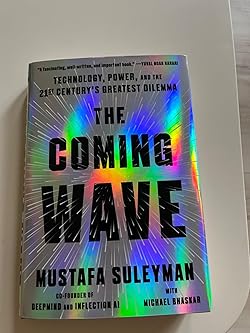
“The Coming Wave: Technology, Power, and the Twenty-First Century’s Greatest Dilemma” by Mustafa Suleyman is a forward-looking exploration of how rapidly emerging technologies—particularly advanced artificial intelligence and synthetic biology—are poised to transform the fabric of our societies. And boy did I devour this book, and boy should every tech leader and elected person read this book. Suleyman co-founded DeepMind, and has worked at the forefront of AI research and innovation. He uses his insider perspective to illuminate both the unprecedented opportunities and the grave risks these technologies present.
I really enjoyed this read, although it was a little bit sleep-affecting during my rapid 3-days with it. At its core, the book argues that we stand on the cusp of a profound technological inflection point, and Suleyman describes a future in which breakthroughs in AI far surpass today’s pattern-recognizing models, evolving into systems that can autonomously shape economies, influence political decisions, and reconfigure labor markets. He similarly anticipates the power of synthetic biology to rewrite the genetic code of living organisms—from microbes to humans—potentially eliminating diseases, extending human lifespans, and boosting food production, but also opening the door to new forms of warfare, unchecked surveillance, and ethically fraught forms of genetic enhancement.
My Key Takeways...
• Technological Inflection Point: We are on the brink of a massive shift in human society due to exponential advances in AI and synthetic biology.
• Dual-Edged Power: These technologies hold immense promise—eradicating disease, enhancing global productivity, and solving large-scale challenges—but also present grave dangers, such as authoritarian surveillance, catastrophic biotech misuse, and AI-driven economic disruption.
• Governance & Control: Without proactive frameworks—robust regulation, international standards, and democratic oversight—technology could run amok, reshaping societies in unintended and harmful ways.
• Global Collaboration: No single entity can manage the unfolding era alone. Cooperation among governments, industries, researchers, ethicists, and civil society is vital to ensuring equitable and responsible stewardship of these transformative tools.
• Moral Imperative: The central challenge of our time is to guide these advancements so that they benefit everyone, mitigating risks while fostering innovation to address humanity’s most pressing problems.
To me, many of the predicted innovations feel like an era we're in just before The Singularity Is Near, just immediately before full AGI arrives. Throughout the narrative, Suleyman grapples with the tension between progress and peril. On one hand, he sees enormous promise: AI could streamline governance and optimize resource distribution, while biotech could solve global health crises and mitigate environmental damage. On the other, he warns that the same tools could amplify inequality, empower authoritarian regimes, and trigger catastrophic accidents—whether from malfunctioning AI decision-makers or engineered pathogens escaping a lab.
A recurring theme I noticed is the notion of control and governance, which worries me given how difficult it is to get governments to agree on anything. Suleyman underscores that without proactive frameworks—regulatory guardrails, global standards, democratic oversight—these emerging waves of technology will not be steered but will crash chaotically onto society’s shores. I would argue we're already there with some emerging LLM killer apps. He really puts a fine point on outlining the need for thoughtful regulation that can keep pace with innovation, insisting that governments and international bodies can (and must) devise agile policies before these technologies become too pervasive and entrenched in strategic infrastructure.
Suleyman posits that no single nation or corporation can manage the consequences of these rapidly advancing sciences alone. I wholehartedly agree. He advocates for unprecedented levels of collaboration among governments, industry leaders, scientists, ethicists, and civil society groups to ensure that the benefits of these technologies are broadly shared rather than monopolized. He sets out a call for humanity to act collectively to manage the innovation and the risks together.
“The Coming Wave” is a wake-up call that neither blindly celebrates technological progress, nor naively condemns it. I feel like Suleyman struck the right balance and tone, and every world leader and tech leader should read this book. Now. Suleyman challenges readers to acknowledge both the immense promise and existential hazard of our near-future tools. He stresses that the most critical task of the twenty-first century will be to strike a careful balance: nurturing innovation to solve humanity’s hardest problems while erecting the necessary checks and balances to prevent catastrophic misuse.